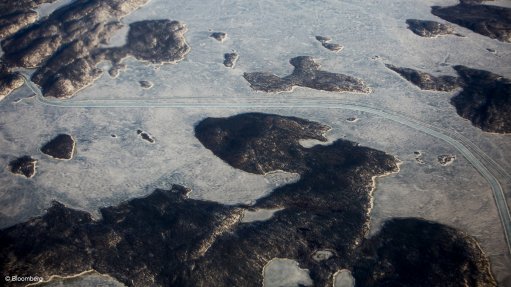
Canada’s North, where the future of the country’s mining industry lies, has received a boost in Tuesday’s federal government Budget, with a commitment of more than C$700-million over the next ten years in new and focused funding for Arctic communities.
The Budget increased the allocation of the National Trade Corridors Fund to northern regions by C$400-million over eight years, starting in 2020/21, to a total of C$800-million to support infrastructure development.
The Mining Association of Canada (MAC) commented that the funding commitment for northern regions was welcome news for the mining sector.
"Mining is the largest private sector driver in Canada's North, directly employing approximately 8% of the total territorial population. However, it is much more expensive, two- to two-and-a-half times more, to build the same precious or base metal mine in the North than in a centrally located region, and 70% of this cost differential derives from the infrastructure deficit," said MAC president and CEO Pierre Gratton.
"The future of Canada's mining industry lies increasingly in remote and northern regions, but will remain unrealised unless we close the infrastructure gap. The commitment to increase the allocation of the National Trade Corridors Fund to Arctic and northern regions by $400-million over eight years is good news."
In addition to its support for the North, the Budget also signalled the government's commitment to investing in its future workforce through a number of training programmes that hold much promise in providing what is needed to support the mining industry's labour force. Given the fact that most mining takes place in remote and northern regions of the country, the expansion of the Student Work Placement Program will be particularly helpful in providing hands-on experience to show the many opportunities available in the sector.
"We are pleased to see a commitment to skills training emphasised in today's budget," continued Gratton. "With the mining industry expected to need close to 100 000 new workers over the next ten years, it is essential that skills development and training be a priority, and the new Canada Training Benefit is a step in the right direction. Given that our sector is proportionally the largest private sector employer of Indigenous peoples, the focus on Indigenous training is extremely encouraging as those communities are particularly essential to the future success of our industry."
The MAC also welcomed the Budget’s allocation for a further C$18-million over three years to Crown-Indigenous Relations and Northern Affairs Canada to support planning by the government of Northwest Territories for its proposed Taltson hydroelectricity expansion project. The proposed expansion will more than double current hydroelectric capacity in the Northwest Territories, reducing reliance on diesel by the city of Yellowknife and the mining sector, as well as providing employment opportunities for Indigenous people and other residents of the territory.
The MAC said that the creation of a Universal Broadband Fund, capitalised at C$1.7-billion, and further leveraging more than C$3-billion through the Canada Infrastructure Bank, would enable universal high-speed Internet access in rural, remote and northern communities. High-speed Internet access in the North would help improve operational efficiencies at mine sites and reduce costs.
The proposed immediate tax deductibility of certain zero emission vehicles was also a positive first step to further enabling electrification in the mining industry, the industry body said. The MAC would work with Finance and Environment and Climate Change Canada decision-makers to broaden the provision to include all vehicles deployed at mining operations, including above- and below-ground heavy equipment.
"Many of the commitments included in Budget 2019, coupled with 2018's federal Fall Economic Statement, which included a five-year renewal of the Mineral Exploration Tax Credit and enhanced accelerated capital cost treatment for resource projects, will play a role in improving Canada's competitiveness, particularly in mining," said Gratton.